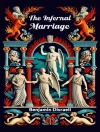In ‘The Romany Rye, ‘ George Borrow masterfully weaves a captivating narrative that blends autobiography, ethnography, and fiction, set against the backdrop of 19th-century England. This sequel to ‘Lavengro’ continues the journey of the protagonist, an essential figure representing Borrow himself, as he immerses into the vibrant culture of the Romani people. Employing rich, poetic prose and a keen eye for detail, Borrow explores themes of identity, belonging, and the often-misunderstood Romani lifestyle, revealing their unique customs and language through the lens of both affection and critique. The literary style reflects Borrow’s inherent romanticism and deep appreciation for the oral traditions that characterize Romani culture, establishing a foundation that resonates with the romanticism and realism of his time. George Borrow (1803-1881), an enigmatic figure and fervent advocate for the Romani community, drew upon his firsthand experiences and love for language to pen ‘The Romany Rye.’ His encounters with Romani people during his travels across England profoundly influenced his work, and his commitment to cultural understanding shines through in this novel. Considering himself an outsider and a seeker, Borrow’s love for the Romani lifestyle deeply permeates his narrative, making it an extension of his personal philosophy and beliefs about freedom and acceptance. For readers seeking an engaging exploration of cultural identity and a journey into the heart of Romani life, ‘The Romany Rye’ is an essential read. Borrow’s skillful storytelling and rich descriptions not only entertain but also illuminate the complexities of social dynamics and personal freedom. This novel is a vital contribution to understanding the Romani people and remains relevant in contemporary discussions about cultural diversity and acceptance.
A propos de l’auteur
George Borrow (1803–1881) was a quintessentially British author known for his novels and travelogues, which vividly depicted the lives of the marginalized Romani people. Born in East Dereham, Norfolk, Borrow developed a voracious appetite for languages and travel at a young age, which would shape much of his literary work. His adventures among various ethnic groups across Europe lent authenticity to his portrayals of the itinerant lifestyle. ‘The Romany Rye’ is a sequel to his semi-autobiographical work, ‘Lavengro.’ In it, Borrow continues to blend elements of memoir with fiction, showcasing his encounters with the Romani people and his fascination with the Romani language. Borrow’s narrative style is characterized by a mixture of realism and romanticism, evident in his rich depictions of the natural landscape and his idealization of the nomadic life. His works are not only valuable for their literary merit but also provide a unique socio-linguistic insight into 19th-century Romani culture. Despite facing controversy for his occasionally romanticized portrayals, George Borrow remains a significant figure in the canon of British literature, whose observational prowess and linguistic passion brought to light the stories of those living on the fringes of society.












